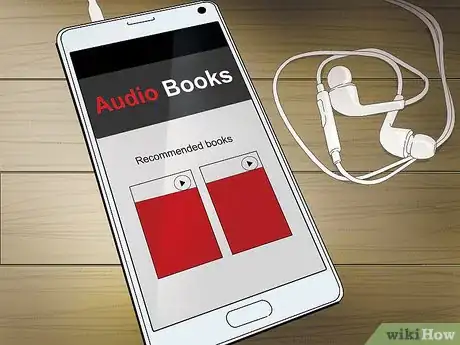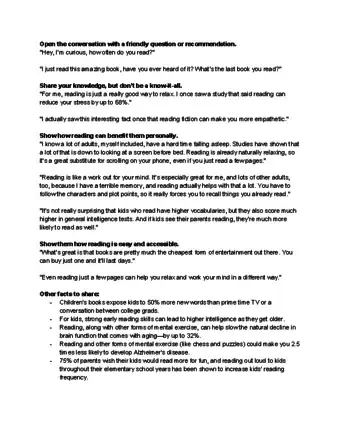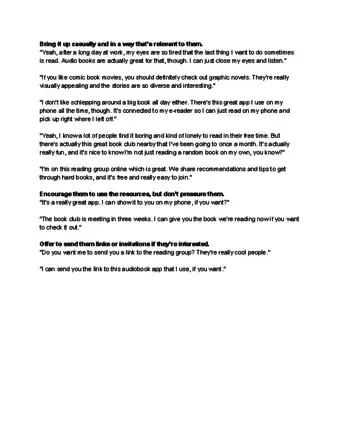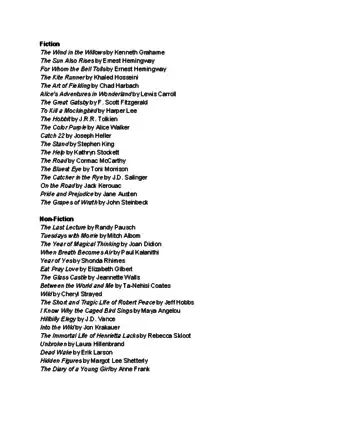This article was co-authored by wikiHow Staff. Our trained team of editors and researchers validate articles for accuracy and comprehensiveness. wikiHow's Content Management Team carefully monitors the work from our editorial staff to ensure that each article is backed by trusted research and meets our high quality standards.
There are 9 references cited in this article, which can be found at the bottom of the page.
This article has been viewed 16,093 times.
Learn more...
Nearly a quarter of all American adults did not read a book within the last year. [1] That’s a large number, but it doesn’t mean those adults didn’t want to read--often, life just got in the way. However, you can do your part to encourage adults in your community to read by motivating adult learning, making reading more fun and informal, and facilitating the accessibility of reading materials.
Steps
Motivating Adult Learners to Read
-
1Lead a workshop on the benefits of adult learning and reading. Workshops are short, informal ways to reach people in your community about any topic. You can rent out space, or use a free space available to you in your local area and advertise for adults that want to learn how to benefit from and begin to be an “Adult Learner.” [2]
- Working with your local library or community college may help you find the right audience, as well as people who know excellent resources for adult learning of various kinds. Come to the workshop with information on these locations, as guests will likely find a lot of resources available to them there.
- Make the workshop fun and informal. Let people have a discussion, introduce games, and appeal to their interests. Create a visual presentation that catches their interest and highlights the benefits of committing to adult learning and reading. [3]
-
2Explain the benefits to be gained from reading. Many people can use books to learn new skills to improve their job performance or lifestyle. [4] Show the workshop guests examples of books that have helped people with certain career skills, childcare, or design and housekeeping methods.
- For example, someone working in the advertising or marketing field may find that a book on classic ad campaigns or a biography of an ad man, like David Ogilvy: An Autobiography, may offer useful history and tips that can help them be inspired and think creatively at their job.
- If someone wants to refresh their home or life, they could read a popular design book or lifestyle book, like Marie Kondo’s The Life-Changing Magic of Tidying Up and explore new ideas about how to arrange their home.
- Bring examples of various fiction and nonfiction books of various genres (business, self-help, romance, true crime, humor) to illustrate that there are books out there for whatever your interests are.
Advertisement -
3Demonstrate the various methods of learning and reading. If someone doesn’t have time or patience to sit down and read a book, you can let them know that there are many other ways to receive the same information. You can listen to audiobooks or podcasts, read articles or graphic novels, and you can read on-the-go using an ebook reader or smartphone app.
- Audiobooks and podcasts are good for people on-the-go, as they can listen to them while walking, driving, or exercising. Let them know how to access these through smartphone apps and books-on-CDs available at libraries and stores. Bring a book-on-CD and smartphone app demonstration to the workshop.
- If they want to stay current on their favorite news articles and essays, explain how they can subscribe to newsletters from their favorite websites that collect the best articles and send a daily or weekly email that gathers them together. This will be a quick and easy way to access articles they might find interesting.
Making Reading an Easy and Fun Activity
-
1Start a book club. Starting a social book club with friends, co-workers or strangers is a great way to read new books, develop relationships, and make readers accountable for finishing a book. There are countless options for how to set up your book club. [5]
- A good way to start a club with a mix of familiar and new faces is to invite people you know and ask each person to bring a guest. This way everyone will feel comfortable, but also be able to meet new people.
- It might be helpful to create a Facebook or Goodreads group that allows club members to chat with one another in-between meetings, as well as stay up-to-date if they can’t make a meeting because of scheduling conflicts. This keeps the club easy, open and accessible to busier members.
- Keep the club informal and democratic. Everyone can input their schedule onto a site like Doodle Poll, to find out the dates and times that will work for the highest number of people. You can also take votes in-person, online or through Survey Monkey to determine which books you will read. Try to keep the meetings at regular intervals, but if you’re reading a very long or very short book consider stretching or compressing time in-between meetings. [6]
-
2Sign up for a library reading program. Many libraries offer summer and/or winter reading programs that require readers to list what they read within a specific time period. In the end, they turn in their lists and earn prizes based on the number of books read.
- Joining in these competitive programs with friends and co-workers can encourage everyone to read more because of the fun contest element involved.
- An example of some prizes could include earning a mug for reading 6 books and being entered into a raffle for a free Kindle if you read over 10 books.
- Some libraries have moved their programs online, which makes the friendly competitive element appealing to social media users who are used to communicating online. [7]
-
3Join a reading-based social media community. There are numerous websites that exist solely for readers to share what they’ve read, make book lists, write reviews and share their opinions and get recommendations from others in the online community. [8]
- These free websites encourage active involvement in the books you read and want to read. You can write reviews, find similar books to ones you enjoyed, and make note of what you want to read in the future. In addition, you can talk to other fans of the book (or non-fans) and feel a sense of community even if you are not part of a book club.
- Examples of these sites are Goodreads, LibraryThing, BookLikes, Riffle, Bookstore and GoRead. Which one you use depends on exactly what you want out of the website, and how comfortable you feel using each interface.
- What you get out each website is dependent on how much you decide to use it, but you will likely find that the more you use it the more engrossed you become in the format and the community.
Facilitating Reading Materials
-
1Propose community shelves or boxes at local businesses or community centers. If books are readily available and free, adults on a budget and on-the-go will be more likely to pick them up - and maybe they’ll find something interesting to them.
- Communicate with local hubs to see if they would be willing to host a communal bookshelf or book box, where people can take books for free and leave behind books they no longer want.
- Places that might be good exchange spots include coffee shops, rec centers, gyms and swimming pools, doctor and dentist offices, train or metro stations and even bars. [9]
- Depending on the space available to you at your location, you can buy a small bookshelf or crate, or use ones already at the location, to hold the books. Pick one that is colorful or eye-catching, and add a noticeable sign. Add your own unwanted books to start.
-
2Become a Friend of the Library. Every local library has a “Friends of the Library” group who is largely responsible for advocating for the library in local politics, raising funds for the library’s maintenance, sponsoring community events and hosting used book sales.
- Contact your local library to learn the exact membership requirements for time and money. Often, membership fees of around $50 per year may be required of you. [10]
- Your membership can then help you meet your local community, reach out to new or returning readers, and facilitate events like book sales, book clubs, and author meet-and-greets that can attract adults to the library and all it has to offer.
-
3Organize and advertise used book sales. Libraries often hold used book sales, where books donated by community members go on sale for a dollar or less. These attract a lot of guests who are interested in finding interesting and cheap items. It can be a good opportunity to encourage people to read the books that they buy.
- Advertising the sale is important in reaching non-regular library patrons. Spread flyers or signs in local businesses and coffee shops, and share them with friends, co-workers, and neighbors.
- Organizing the books into clear sections—biography, European history, mystery, adult fiction, YA, books about music—will help customers find what they are interested in.
- Additionally, asking people what interests them can help you point them to the section most relevant to their interests. This way they won’t waste time browsing and can hopefully find a book they will actually read, because it appeals to what they enjoy.
Talking About Reading
References
- ↑ http://www.pewresearch.org/fact-tank/2018/03/23/who-doesnt-read-books-in-america/
- ↑ https://ctb.ku.edu/en/table-of-contents/structure/training-and-technical-assistance/workshops/main
- ↑ https://ctb.ku.edu/en/table-of-contents/structure/training-and-technical-assistance/workshops/main
- ↑ https://elearningindustry.com/17-tips-to-motivate-adult-learners
- ↑ https://www.chroniclebooks.com/blog/2016/01/05/10-simple-ways-to-get-back-into-reading-again/
- ↑ https://bookriot.com/2017/08/09/how-to-start-a-book-club/
- ↑ https://bookriot.com/2016/06/06/library-summer-reading-programs-for-adults/
- ↑ http://www.ingramspark.com/blog/the-power-of-online-book-communities
- ↑ https://readingchallenge.scot/blog/how-communities-can-encourage-reading






































































